Why Has Public Approval Of The Supreme Court Declined?
Public opinion of the Supreme Court has declined in recent years. But It's not because of anything the Court did.
A new CBS News/New York Times poll reports that public approval of the Supreme Court has slipped from the high levels it was once at in the past:
WASHINGTON — Just 44 percent of Americans approve of the job the Supreme Court is doing and three-quarters say the justices’ decisions are sometimes influenced by their personal or political views, according to a poll conducted by The New York Times and CBS News.
Those findings are a fresh indication that the court’s standing with the public has slipped significantly in the past quarter-century, according to surveys conducted by several polling organizations. Approval was as high as 66 percent in the late 1980s, and by 2000 approached 50 percent.
The decline in the court’s standing may stem in part from Americans’ growing distrust in recent years of major institutions in general and the government in particular. But it also could reflect a sense that the court is more political, after the ideologically divided 5-to-4 decisions in Bush v. Gore, which determined the 2000 presidential election, and Citizens United, the 2010 decision allowing unlimited campaign spending by corporations and unions.
“The results of this and other recent polls call into question two pieces of conventional wisdom,” said Lee Epstein, who teaches law and political science at the University of Southern California. One is that the court’s approval rating has been stable over the years, the other is that it has been consistently higher than that of the other branches of government, Professor Epstein said.
(…)
Either way, though, many Americans do not seem to expect the court to decide the case solely along constitutional lines. Just one in eight Americans said the justices decided cases based only on legal analysis.
“As far as the Supreme Court goes, judgments can’t be impersonal,” Vicki Bartlett, 57, an independent in Bremerton, Wash., said in a follow-up interview. “When you make judgments, it’s always personal. But the best hope is that they will do their job within the legal parameters.”
The public is skeptical about life tenure for the justices, with 60 percent agreeing with the statement that “appointing Supreme Court justices for life is a bad thing because it gives them too much power.” One-third agreed with a contrary statement, that life tenure for justices “is a good thing because it helps keep them independent from political pressures.”
Thirty-six percent of Americans said they disapproved of how the Supreme Court was handling its job, while 20 percent expressed no opinion. Though the court’s approval rating has always been above that of Congress — which is at 15 percent in the latest poll — it has occasionally dipped below that of the president.
A Gallup tracking poll conducted at the same time as the new survey by The Times and CBS News had President Obama’s approval rating at 47 percent, but about as many respondents disapproved of his performance.
The court’s tepid approval ratings crossed ideological lines and policy agendas. Liberals and conservatives both registered about 40 percent approval rates. Forty-three percent of people who hoped the court would strike down the health care law approved of its work, but so did 41 percent of those who favored keeping the law.
These numbers are consistent with a Gallup poll that came out just this past October which put public approval of the Court at 46%, down a full 15 percentage points from 2009 when the same question elicited at 61% approval rating for the Court. Like the CBS/Times poll, the Gallup survey showed public opinion to be relatively consistent regardless of political ideology or party affiliation.
So, what’s the cause of the public’s decline in approval for the Court? The easy answer that many will jump to is that it’s related to the decisions that the Court has made, but it strikes me that this explanation doesn’t make sense, or at least that it’s not entirely complete. To see what I mean, take a look at the chart that Gallup published along with it’s October 2011 poll:
If it was public dissatisfaction with the Court’s work that was the cause of this dip in approval, then one would have expected to see a significant drop off in the aftermath of the decision in Bush v. Gore. Instead, public opinion remained relatively consistent until 2004-2005 when it began dropping, and indeed reached a point in 2005 where slightly more people disapproved of the Court than approved. Now, arguably, the poll may reflect the general increase in public confidence in government at all levels that we saw in the wake of the September 11th attacks. However, after that “rally round the flag” effect wore off and public distrust of other government institutions continued to return to previous levels, public confidence in the Court increased and indeed returned to the levels it was at immediately after September 11th. Until the past three years when it started declining again.
This suggests to me that public approval of the Court isn’t necessarily heavily influenced by the outcome of individual cases. Yes, cases like Bush v. Gore, Kelo v. City of New London, and Citizens United may be controversial and generate a lot of focused opposition from interested parties, but there really doesn’t seem to be any evidence that any single decision, or any group of decisions for that matter, has that much of an influence on how the public feels about the Court. Indeed, back in 2010 on the eve of Elena Kagan’s confirmation hearings, one poll found that few Americans could name a single Supreme Court case other than Roe v. Wade, and that they didn’t have a very good idea of what kind of work the Supreme Court actually does. Another poll a month earlier found that most Americans couldn’t name the members of the Court. It’s doubtful those numbers have changed significantly in the past two years. So, placing the blame for the decline on public opinion on what the Court has actually does doesn’t seem to make sense.
Instead, I think what we’re looking at here is something pretty close to what David Frum points out in his comment about the Times poll:
Why has confidence in the impartiality of the Supreme Court tumbled to 44%? Why not? Confidence in every American institution has corroded, even the military. When American society functions well, confidence rises, as it did in the 1980s and again in the mid-1990s. When society functions poorly, doubts spread. Nor are those doubts misplaced.
Frum has it mostly right, I believe. Especially over the past three years, public trust in government at all levels has declined significantly, largely in response to the economic downturn and the sense that government either isn’t or can’t do anything about it. Being part of the government, and the one most shielded from public view at that, it’s no surprise that the Supreme Court would suffer in the eyes of the public along with every one else.
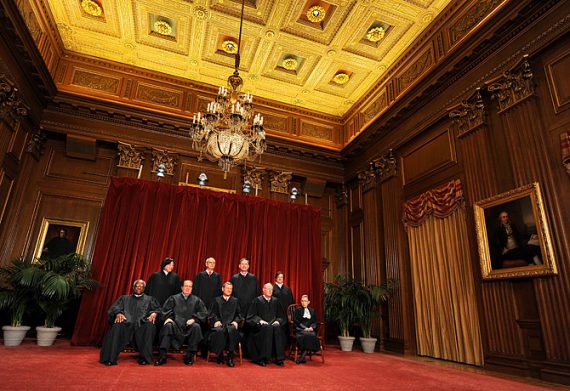
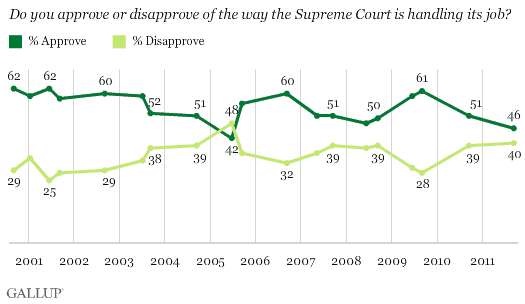

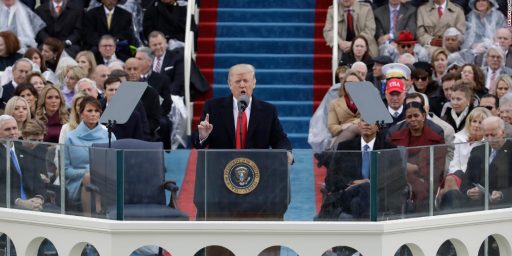
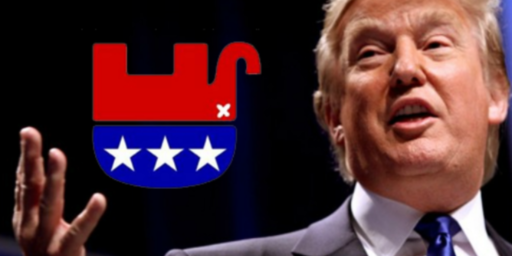


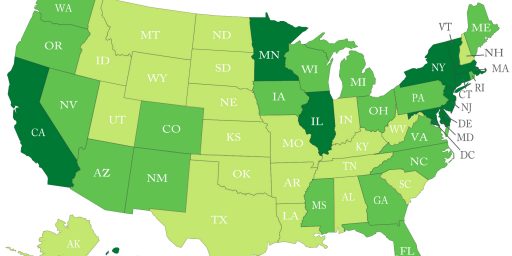
I think you are generally correct; however, I think you can’t discount the long term corrosive effects of continual criticism of courts in general as “unelected activist judges” when things don’t go a particular party’s way.
The Court is the last major institution to experience the loss of confidence of the public. The public isn’t happy with big business, union labor, the education establishment, local government, state government the President, Congress and now, the Court.
The public is not happy with any major institution.
“We now conclude that independent expenditures, including those made by corporations, do not give rise to corruption or the appearance of corruption.”
This gem of legal reasoning is the key sentence in Justice Kennedy’s majority decision in the Citizens United case. If it were more widely known, approval of the Supreme Court would be in single digits.
Stan,
Except of course that, as a legal matter, Justice Kennedy and the majority in that case were right.
@al-Ameda: That’s because the public recognizes that none of the above has been working together for the betterment and, Instead, feels that the organizations are all about how much power each can grab for itself and its direct beneficiaries.
@Stan: And you can add the media to that list, too.
@Nikki: Oops, that was for al-Ameda.
@Nikki:
It isn’t the Supreme Court’s job to “work for public betterment” it’s their job to interpret and apply the law.
@Nikki:
Big Journalism was definitely an omission on my part.
FoxNews is the new model – choose the reality you want to report, or make the reality you want to report. The public does not now generally believe in an objective reality, people now believe much of the news if it’s reported from a source they agree with.
Over the years, the Supreme Court has indeed become more politicized. The puzzling Kelo decision was the latest turning point, which the public rightly saw as a power grab. If we can’t trust the SCOTUS to uphold the concept of private property rights, something is definitely wrong with this institution.
My turning point was the irrational 14th Amendment decision that manufactured citizenship rights to anyone who happened to be born here. This decision ignored the clause “…and subject to the jurisdiction thereof.” It’s clear that the original intent was that if someone was a citizen of another country, their children born on American soil were also foreign citizens. In other words, citizenship of the parents was the determining factor, not the physical location of birth.
The public’s poor opinion of the Court seems to be rising in direct corrolation with their drift away from the plain language and intent of the Constitution. One needn’t be a scholar to understand the principles of our Founding Document.
@Doug Mataconis: Which we would believe except we have “Bush vs. Gore”. Allowing the vote to continue would not have aided the public betterment?
And if you believe that Citizens United hasn’t led to at least the appearance of corruption, you’re more gullible than one would believe.
Nikki,
If Bush v. Gore was such an outrageous decision then why did public approval for SCOTUS increase for three years afterwards?
@Doug Mataconis: Who knows? I’m not doubting that Frum is at least partially right. But it all has a cumulative effect. And I repeat…if you believe that Citizens United hasn’t led to at least the appearance of corruption, you’re more gullible than one would believe.
I think it’s the corrosive effect of the appointment process. Most of us don’t pay too much attention the the court, that’s true. I can’t name specific case names but do know the results of Kelo, Gore vs. Bush, Citizens, etc.. But I do pay attention to the appointing process and all the grandstanding crap that goes on in the Senate hearings. You want to know why there is less confidence in almost all our institutions? In my opinion it’s the constant undermining of the respect for the institutions by interest groups and their sock puppet politicians.
I think that at the time, most people viewed Bush v. Gore as either the right decision, the least worst decision, a decision in a complete mess, or a bad decision from otherwise reasonable people.
Toss in the fact that Gore really didn’t do much to distinguish himself from Bush, and Bush’s “compassionate conservative” thing, and it seemed like it was a decision that put one of two nearly interchangeable politicians in power.
It was only after a series of bad decisions that people began to notice the real issue — the court is entirely political.
@Doug Mataconis: “Except of course that, as a legal matter, Justice Kennedy and the majority in that case were right.”
Well, no, they weren’t. Whether it creates corruption or the appearance of corruption is something yet to be determined. Let’s check back in 10 years and see how overturning decades of established law and practice works out.
Mike
@Gustopher: “I think that at the time, most people viewed Bush v. Gore as either the right decision, the least worst decision, a decision in a complete mess, or a bad decision from otherwise reasonable people.”
I don’t think what “most people” thought had much to do with anything. What happened with Bush v. Gore is that our political, media and economic elite were 99.999999% in agreement that no questioning of the decision would be allowed or tolerated, effectively strangling the issue in its crib.
Mike
@Doug Mataconis: Public approval/disapproval of court rulings is roughly as useful as public approval of a corporation’s information security measures.
@al-Ameda:
Except, I would say, the military, which is interesting from a historic persective. ..
Bush vs. Gore put to rest any doubt of the politicization of our Supreme Court. Kelo and Citizens United are just spiking the football.
@Galanti: Not that they aren’t trying with the evangelical bent of the Air Force Academy.
@Galanti: As long as they stay apolitical and respect the civilian control, the military will maintain respect.
I think a lot of people become disillusioned with some of the rulings of the Warren Supreme Court. These tended to be way out of the mainstream thinking. I remember that many wanted to impeach Justice Warren, but I am not sure that can even be done. A lot of people do not like the “lifetime” appointments of judges.
The Supreme Court has become entirely politicized. The justices appear at gatherings and pal around with political activists. Youth has become a primary factor in selection, so that the judges chosen can serve longer. I dont think anyone outside of the legal profession believes that they are rendering impartial interpretation of the law. Since they are really politicians, why should they be more popular than other politicians?
Steve
@al-Ameda: The public
isn’t happy withis largely ignorant about big business, union labor, the education establishment, local government, state government the President, Congress and now, the Court, but they are bombarded 24/7/52 via TV, radio, and the blogosphere, about how horrible these institutions are.FTFY.
Hell, replace GInsburg with someone like Jennifer Elrod or Allison Eid and then replace Breyer with someone like Wallace Jefferson or William Pryor and I would not care less if Zombieland’s “approval” of the SCOTUS declined to only me, myself and I. The salient points is that a High Court reconstituted as such would have the opportunity and more importantly the ability to erase from the law books all major traces of leftism. I look forward to those prospects.
@Tsar Nicholas:
Yes, they should be even more politicized and in fact should be even more openly tools of the GOP and bootlicks for the wealthy. That’s what we need, a Supreme Court that does whatever Fox News tells them to do. That’s how you build institutions. While we’re at it, let’s politicize the military. I mean why should the people have any trustworthy institution left?
@Doug Mataconis: If the law says that contributions by wealthy donors, Koch on your side and Soros on mine, doesn’t constitute corruption or the appearance of corruption, then the law is an ass.
@BackwardsBoy:
Jesus Christ! You’re pretty lucid for someone over 114 years old.
The Court’s willingness to turn over all the tables with tiny 5-4 majorities doesn’t earn respect. The lack of expected restraint introduces a lot of uncertainty that casts a pall over the future.
The chart starting after Bush against Gore gave me more sad than surprise…
I’ve been pissed off ever since Marbury v. Madison.
Michael,
Well, you 209 year old guys can be kind of ornery
That is typical of the delusional libertarian mind….as if so many politicians in Washington (and in many other places, of course) aren’t whores on sale to the highest bidder…
Oh absolutely! Brown v. Board of Education and Loving v. Virginia were just so radical and out of the mainstream….
Hence the beauty of Libertarianism. All the benefits of being a Republican with none of those nasty consequences to explain away. It’s the best of both worlds really. All you really need is pithy replies to questions with far to many punctuation’s????!!!!!!!
@Davebo: You have to use the term “sheeple” to be a real libertarian, though. Bonus points if you add WAKE UP!!!!! every couple of sentences.
@BackwardsBoy: Dude, you are clueless. The 14th Amendment went through the standard approval process by which an Amendment becomes part of the Constitution. You can no more say the 14th Amendment is “anti-constitutional” than you can state your lungs aren’t part of your body.
How can a part of the Constitution be “anti-constitutional”? It doesn’t make sense. You could possibly say that one part of the Constitution contradicts another, and then we can have a squabble over which part prevails, but one part being “anti-constitutional”? No dice.
@grumpy realist: You should see his blog. I mean, I put my hand up for a snippet of crazy every once in a while, but we’re talking a totally disconnect from reality.
And then there are those who don’t want the government to do anything about it.
Of course, I suspect those guys like the Supreme Court just fine.
Because they’re seen as increasingly being just another element of party politics (on both sides), and the majority of people dislike politics in general, and party politics in particular?
The illusion before was that they were above politics, and at least tried to serve law and justice. I’d say that its sinking in that most of the justices (on both sides) are more interested in advancing their own political views than the law. Perhaps that’s a good thing, or at least inevitable, but the question becomes in that case, why aren’t they elected directly, and why don’t they have a limit on their terms, like other politicians?
@Racehorse: You do realize that the controversial decisions of the Warren Court were happening between the time that I was 2 and about 16 or 17, right? I bring that up because I will be 60 in 4 weeks.
The chart begins calculating public opinion of the court from 2001; roughly 40 years after the glory days of the Warren Court. I can see the point you want to make, but your math is 2 generations off.
@Doug Mataconis: If a key fact that forms the basis for the opinion by a Justice in a 5-member majority is simply wrong, then, presumably that Justice would have voted differently had he realized his error in fact – resulting in a different decision and a different law. Given that, how does blithely saying the decision was “right” in any way answer the charge that the fact is wrong?